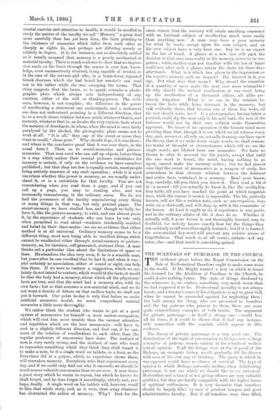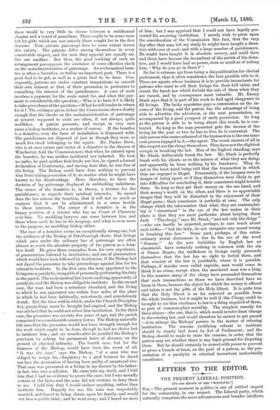THE SCANDALS OP PURCHASE IN THE CHURCH.
The theory of private patronage is a very good one. The distribution of the right of presentation to livings over so large a number of patrons secures variety in the schools of ecclesi- astical opinion. If all the livings were at the disposal of the Bishops, an energetic bishop would gradually fill his diocese with men of his own way of thinking. The party to which he was opposed would have no chance of survival. The type of opinion to which Bishops naturally incline, when distributing patronage, is not one which we should like to see universal. Moderation and a knack of not giving offence are very valuable qualities, but they are hardly compatible with the higher forms of spiritual enthusiasm. It is very desirable that benefices should be largely filled by men of prudent temper, and good administrative faculty. But if all benefices were thus filled,
there would be very little to choose between a rnridecanal chapter and a board of guardians. There ought to be some room left for gifts which are not entirely those sought for in the first deacons. Now, private patronage does to some extent insure this variety. The patrons differ among themselves in every conceivable respect, and the men they appoint are equally un- like one another. But then, the good. working of such an arrangement presupposes the existence of some effective check on the maladministration of patronage. An ecclesiastical bene- fice is often a lucrative, as well as an important post. There is a good deal to be got, as well as a great deal to be done. Con- sequently, patrons are under constant temptations to consult their own interest or that of their presentee, in preference to consulting the interest of the parishioners. A cure of souls involves a payment for the souls cared for, and when this pay- ment is considerable, the question,—Who is to have it ? is likely to take precedence of the question,—What he will render in return for it P The evidence given before the Commission shows clearly enough that the checks on the maladministration of patronage at present supposed to exist are often, if not always, quite worthless. A patron presents, and except in very rare cases a bishop institutes, as a matter of course. If the benefice is a donative, even the form of installation is dispensed with. The parishioners are disposed of just as though they were so much live stock belonging to the squire. Mr. Parker Drew, who is at once owner and rector of a donative in the diocese of Winchester, told the Commissioners that when he entered upon the benefice, he was neither instituted nor inducted. He took no oaths, he paid neither first-fruits nor fees, he signed a formal declaration of Conformity, and having done that, he was free of the living. The Bishop could have done nothing to prevent him from taking possession of it, no matter what he might have known to his disadvantage. Here, therefore, we have the doctrine of lay patronage displayed in unblushing nakedness. The owner of the donative is, in theory, a trustee for the parishioners, as regards their spiritual interests,. So sacred does the law esteem the function, that it will not so much as suppose that it can be administered in a sense hostile to these interests. The owner of a donative is in the happy position of a trustee who has no Court of Chancery over him. No meddling lawyers can come between him and those whose souls he has in his keeping; and what is even more to the purpose, no meddling bishop either.
The case of a donative seems an exceptionally strong one, but the evidence of the Bishop of Peterborough shows that livings which pass under the ordinary law of patronage are often almost as much the absolute property of the patron as a dona- tive itself. He gives three examples, from his own experience, of presentation followed by institution ; and one of presentation which would have been followed by institution, if the Bishop had not dared the presentee to take proceedings against him for his refusal to institute. In the first case, the man appointed to the living was a paralytic, incapable of personally performing his duty in the parish. The ecclesiastical law knows nothing, apparently, of paralysis, and the Bishop was obliged to institute. In the second case, the man had been a notorious drunkard, and the living to which he was appointed was within four miles of the place in which he had been habitually, notoriously, and scandalously drunk. But the time within which, under the Church Discipline Act, proceedings must be brought had expired, and the Bishop was advised that he could not refuse him institution. In the third case, the presentee was seventy-five years of age, and the parish comprised two considerable country towns. The Bishop naturally felt sure that the presentee would not have strength enough for the work which ought to be done, though he had no choice but to institute him ; and six months after he justified the Bishop's prevision by asking for permanent leave of absence, on the ground of physical infirmity. The fourth case, but for the firmness of the Bishop, would have been the worst of all. "It was the case," says the Bishop, "of a man who was obliged to resign his chaplaincy to a gaol because he dared not face the accusation of having been guilty of unnatural vice. That man was presented to a living in my diocese by his father- in-law, who was a solicitor. He came into my study, and I told him that I had no evidence to prove the case; but I was morally certain of the facts, and the man did not venture to deny them to me. I told him that I would endure anything, rather than institute him. Happily for me, the man was respectably married, and feared to bring shame upon his family, and would not face a public trial ; and he went away, and I heard no more
of him ; but I was apprised that I could not have legally pre- vented his receiving institution. I merely wish to press upon the consideration of the Commission this fact, that the very day after that man left my study he might have bought a dona- tive, with cure of souls and with a large number of parishioners. He might have bought it in absolute secrecy, and could then and there have become the incumbent of the parish of the dona- tive, and I would have had no power, even as much as of asking him, Why do you go in there ?' "
So far is extreme age from being a disqualification for clerical preferment, that it often constitutes the best possible title to it. There are agents whose business it is to provide incumbents for patrons who want to sell their livings for their full value, and resent the harsh law which forbids the sale of them when they are vacant, and by consequence most valuable. Mr. Emery Stark says that it is part of his work to find aged clergymen to fill livings. The lucky appointee pays a commission on the in- come of the living, and the patron has the advantage of being able to advertise the advowson, or the next presentation, as accompanied by a good prospect of early possession. So long as the patron is able to to bring about this result, he is con- tented. So long as the man presented gets the income of the living for the year or two he has to live, he is contented. The only person who seems ashamed of the transaction is the one inno- cent person engaged in it,—the agent. The worst sinners of all in this respect are the clergy themselves. They have not the slightest scruple in breaking the law. Men of the highest standing, says Mr. Stark, deliberately break the law. Mr. Stark is perfectly frank with his clients as to the nature of what they are doing, and apparently he loses nothing by his frankness. They do not in the least mind being told that the transaction in which they are engaged is illegal. Presumably, if the bargain were in danger of being upset, or if they themselves were likely to get into difficulties for concluding it, their conscience might trouble them. So long as they get their money on the one hand, and their money's worth on the other, and there is no appreciable danger that they will be disturbed in the enjoyment of their illegal gains ; their conscience is perfectly at ease. The only change which the information that what they are contemplat- ing is " simoniacal " in the eye of the law makes in their plans is that they are more particular about keeping them dark. " The clergy," says Mr. Stark, " and not only the clergy " —who can hardly be expected, perhaps, to care much about such trifles—" but the laity, do not recognise any moral wrong in breaking this law." Some part, perhaps, of this extra- ordinary moral obtuseness is due to the use of the word " Simony." As the acts forbidden by English law as simoniacal, have certainly nothing in common with the sin of Simon Magus, the traffickers in livings easily persuade themselves that the law has no right to forbid them, and that evasion of the law is justifiable, where it is possible. Perhaps, if murder were called regicide, men would come to think it no crime, except when the murdered man was a king. In like manner, many of the clergy have persuaded themselves that such transactions as those we have described have no harm in them, because the object for which the money is offered and taken is not the gifts of the Holy Ghost. It is quite true that the Holy Ghost is as far removed as possible from the whole business, but it might be well if the Clergy could be brought to see that obedience to law is a thing required of them, as part of common-place morality. The simplest remedy for these abuses—the one, that is, which would involve least change in the existing law, and would therefore be easiest to get passed —is to enlarge the Bishops' powers in the matter of refusing institution. The reasons justifying refusal to institute should be clearly laid down by Act of Parliament; and the Bishop should be made to state his reasons, in order that the patron may see whether there is any legal ground for disputing them. But he should certainly be armed with power to prevent so gross a breach of trust, on the part of a patron, as the pre- sentation of a paralytic or criminal incumbent undoubtedly constitutes.



































 Previous page
Previous page